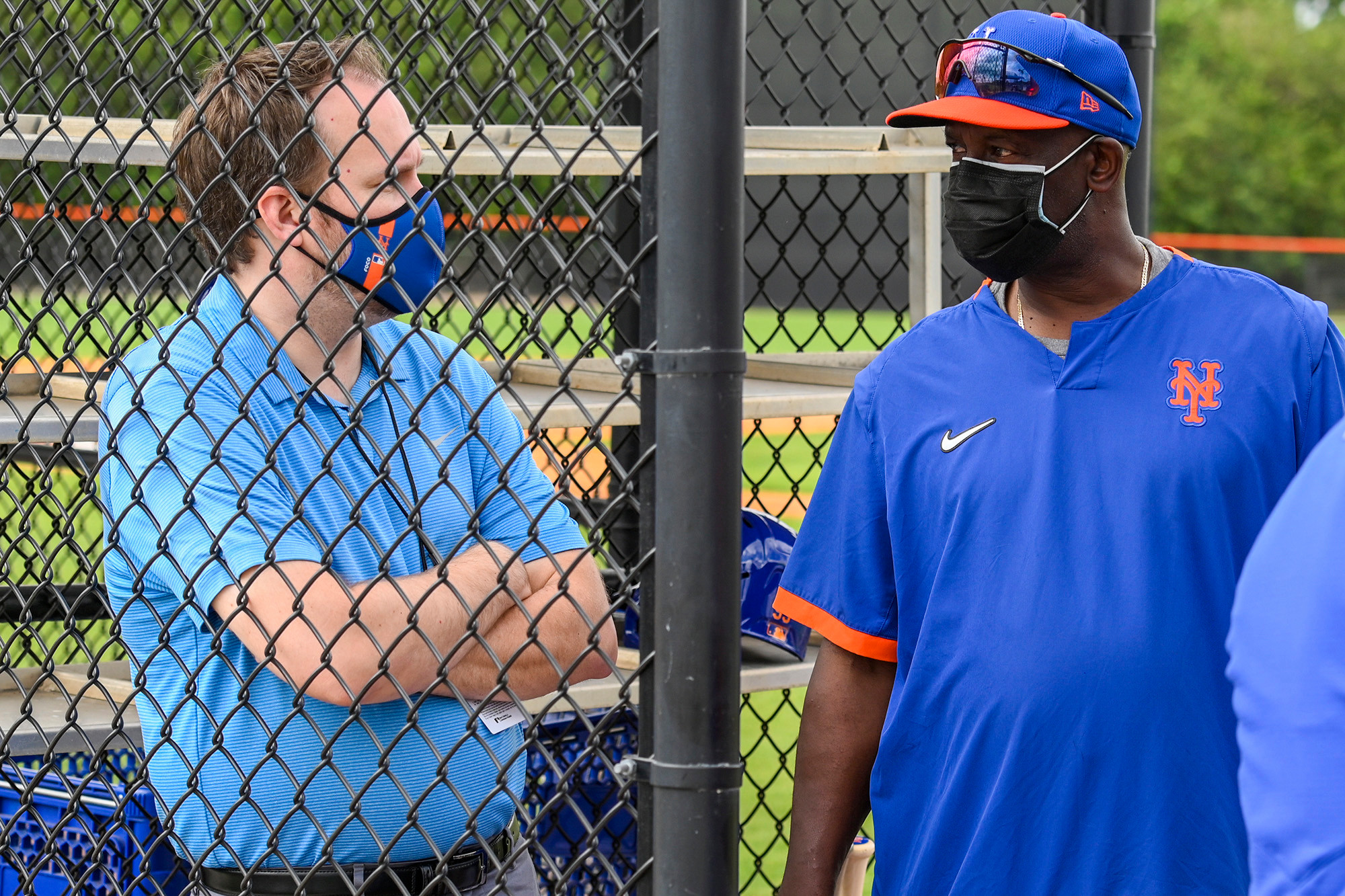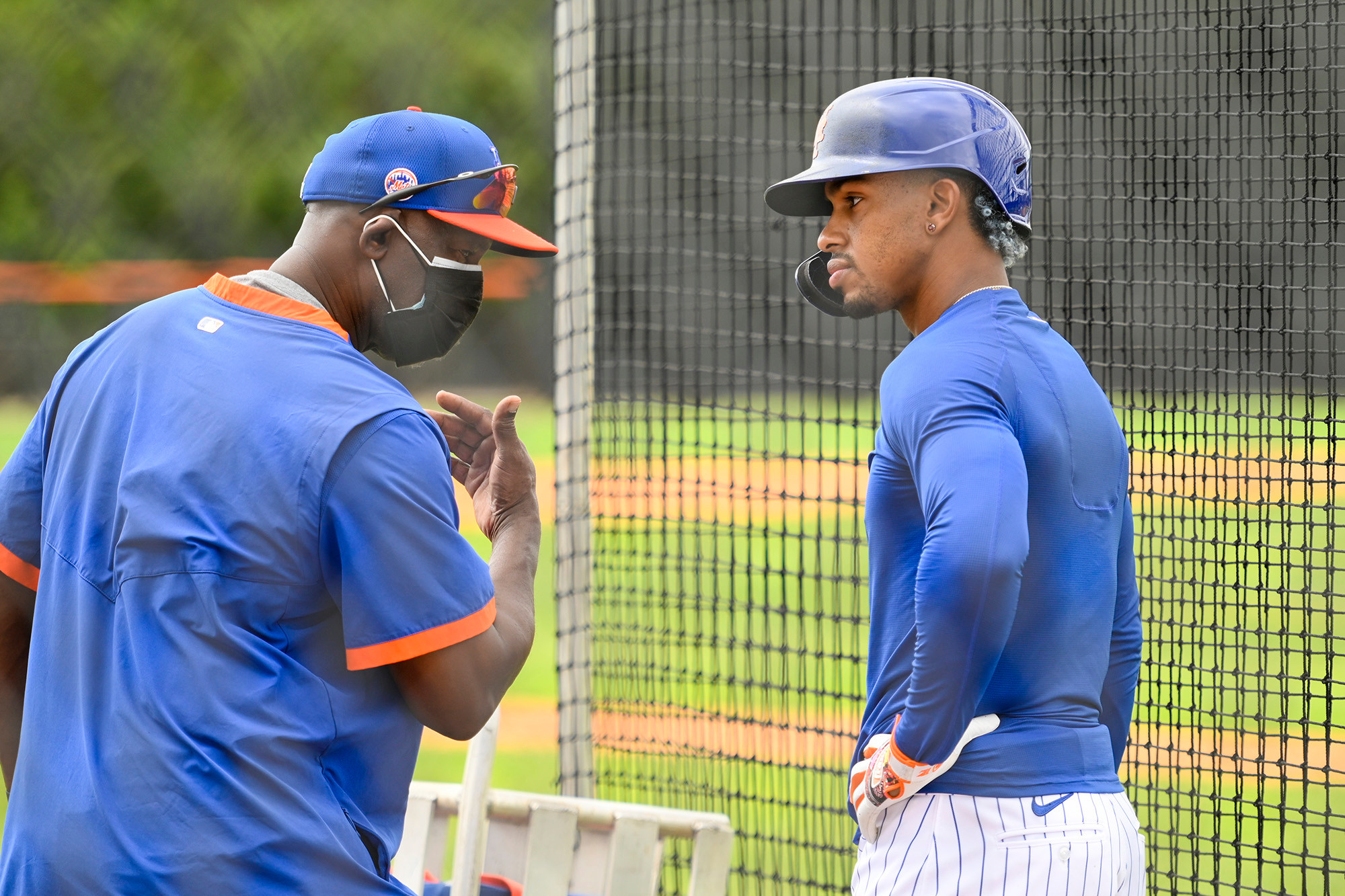More On: chili davis
Inside Mets’ decision to fire Chili Davis and the origin of Donnie Stevenson: Sherman
Chili Davis had ‘weird feeling’ before being fired by Mets
Mets fire hitting coaches Chili Davis, Tom Slater
Zack Scott had been meeting with his subordinates about making a change. Sandy Alderson had been thinking similarly.
More from:
Joel Sherman

Astros may have stolen this Yankees core's best chance at World Series: Sherman
What makes the Baseball Hall of Fame ballot extra special: Sherman
Yankees may be in for rude Bronx awakening: Sherman
Slumping Yankees outfield has morphed into a bigger concern: Sherman
Yankees' staleness jarring as underlying issues mount: Sherman
Donnie Stevenson neither fired Chili Davis nor replaced him.
That was team president Sandy Alderson and acting general manager Zack Scott. They decided Davis and assistant hitting coach Tom Slater had to go. And they met no resistance from owner Steve Cohen to make a move so early in a season. If you don’t like the process, if you don’t think it will change for the better then, then like in his hedge fund business, Cohen saw no reason to dawdle. Not when the NL East looks so winnable.
So Davis and Slater were dismissed after Monday night’s loss in St. Louis. But the decision had been planned for days — or before the birth of “Donnie.” Alderson and Scott were disenchanted not only with the results, but more with process. Scott had observed hitting meetings — to Davis’ annoyance, a source said — and what emerged in the front office’s belief was a lack of individualized plans, mechanical adjustments and authoritative instruction in the meetings.
Scott had been meeting with his subordinates about making a change. Alderson had been thinking similarly. Then after last Wednesday’s 1-0 loss to the Red Sox in which the Mets had two hits, 15 strikeouts and were at one run in 18 innings with one ineffective, indecisive at-bat after another vs. Boston, the duo met and found themselves in unison. Manager Luis Rojas was not in simpatico. But he was outnumbered and outranked.

A quick move, however, could not be made. Too much was ongoing. An alternate site was closing, the minor league season was about to begin and both of the hitting replacements — minor league director of hitting development Hugh Quattlebaum and director of player development Kevin Howard — needed their jobs covered and, in a time of COVID, to reorganize where they and their families would be spending the summer.
During the near week it took to organize all of this, Pete Alonso and his teammates made public the figment of Donnie Stevenson. “Donnie” was neither a broadside at Davis nor a desperate signal to their bosses. The imaginary hitting/mental skills Sherpa was designed to defuse pressure building around the deflated offense. It was good-natured. But the laughs and an uptick in offensive production could not save Davis. The wheels were in motion.
The dismissal of Davis feels, in fact, from the category that led Brodie Van Wagenen to dismiss pitching coach Dave Eiland in June 2019. A new leader inherits an old school coach and has doubts if their belief systems will mesh. Some time is given to see. Belief grows strong that the teaching style is not acceptable. That phase of the team struggles. The club can make the playoffs and the new leadership doesn’t want to wait until after the season to make a move.
Like the gruff Eiland with the collaborative Van Wagenen, Davis was never going to be a fit for the analytic-leaning Alderson, Scott or all the layers of modernity they were speeding to implement in the system to try to play catch up against the sport. Davis defines old school. As a player, he never discussed injuries. His line was that if he was playing he was healthy and there would be no excuses and if he wasn’t that meant he wasn’t healthy enough to help the team, no discussion.
Davis had lost hitting coach jobs with the Red Sox (where Scott worked) and the Cubs because of the old/new conflict. Scott wanted to see if Davis had grown to embrace modern devices/strategies. So, he attended some hitting meetings — think a principal observing a teacher in a classroom. Scott did not see enough. Modern players have grown hungry for individual mechanical and statistical analyses, and many players seemed to be gravitating toward the analysts for help rather than the hitting coach.
And like with Eiland in 2019, the poor results were making it easier to make an abrupt change. Yes, this was a Francisco Lindor issue — his high profile, acquisition and salary making him the most obvious target for poor offensive output. But James McCann looked lost and so did Dom Smith. And Alderson’s offensive philosophy has remained the same — get on base and drive the ball, preferably over the fence.
Alderson was not seeing approaches to suggest hitters were going up with detailed plans and he was seeing too little offensive oomph. Alderson’s belief system is decades old — the team that hits the most homers wins. Clubs that outhomer a foe have a .772 winning percentage since 2015 and .782 this year. The 2021 Mets had the second-fewest homers per plate appearance, but were hovering around .500 because their pitchers had given up the fewest homers per plate appearance. What if a pitching staff that should slowly be getting Carlos Carrasco, Seth Lugo and Noah Syndergaard back could be better supported? This fueled Alderson.

Van Wagenen had hired Davis as part of a strategy to try to use the whole field more — it was among the reasons Robinson Cano was acquired, by the way, to serve as a first-hand guide to go line to line. The Alderson regime is thinking more over the wall than line to line. But there was just too much to do in the offseason to upend a whole major league coaching staff, especially since there was a late start with Cohen’s franchise purchase, Jared Porter’s hiring and firing and Scott’s ascension. So the decision was made to see if Davis plus a new support staff would work. Alderson and Scott did not think it was.
Cohen is process-oriented from his hedge fund and believes that constantly improving the process is essential. Alderson and Scott told Cohen the hitting process was broken and it would not get better, and Cohen saw no reason not to act swiftly then. Jeremy Barnes had finished as the runner-up to Howard to run the farm system and the Mets were so impressed that they hired Barnes too. So he steps into a bigger role. Alderson already had brought back to the organization Dick Scott, who had run the farm system when Alderson was the Mets’ GM. So Scott also will assume more responsibility.
But the key was not the future with the farm, but the present. A window is open to win this division. The leadership of the Mets did not think a figment of the imagination hitting coach would improve the process. The decision was made that different actual human voices were needed.
This story originally appeared on: NyPost - Author:Joel Sherman















